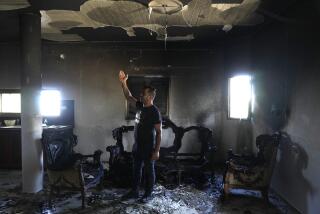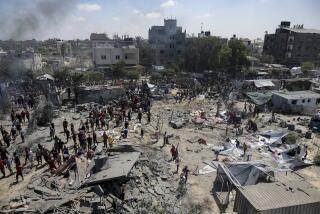Ex-Arafat Ally Says His Faction Killed Israeli Settler
BEIRUT — The former commander of PLO Chairman Yasser Arafat’s once-powerful militia in Lebanon has claimed responsibility for the attack last month on a Jewish settler in the West Bank, signaling a critical break within Arafat’s Fatah organization and triggering the worst crisis for the Palestine Liberation Organization since it signed a tentative peace accord with Israel.
As yet another Arafat supporter was shot and killed Monday in southern Lebanon, a new breakaway Fatah faction said it committed the Oct. 29 attack that prompted Arafat’s first public condemnation of the killing of an Israeli by a Palestinian nationalist.
The faction’s typewritten statement, distributed over the weekend in the southern Lebanese city of Sidon, signaled the extent to which Arafat has lost control of many of his military forces in south Lebanon that were once the mainstays of the PLO’s military might.
Lt. Col. Munir Makdah, commander of about 4,000 PLO militiamen in Sidon, was relieved of his command by Arafat last month after publicly voicing opposition to the peace agreement with Israel. He was replaced by a council of four other military commanders, two of whom have also opposed the peace plan.
In an interview last week in his home in the teeming Palestinian refugee camp of Ein el Hilwa, Makdah said his 4,000 fighters will remain loyal to him and will oppose the peace agreement with Israel.
“This decision for peace is not a legal decision,” Makdah said. “We have been refugees for 44 years, and in each Palestinian home there are martyrs. So how could such a decision having an impact on everybody be made by only a few? In such a decision, everyone should have shared, and it should have been a democratic decision.
“Now (Israeli Prime Minister Yitzhak) Rabin has threatened to give a blow to the 4 million Palestinians who represent the diaspora and to the 60% of Palestinians who oppose this agreement, and as long as there is one Palestinian refugee outside his country, it means there will be no peace with the Jews,” Makdah declared.
Makdah announced the formation of his dissident Black 13th of September Brigade two days before the Oct. 29 killing of Jewish settler Haim Mizrahi in the West Bank. That slaying caused a crisis in the Israeli-PLO talks when Israel announced it had arrested five members of Arafat’s Fatah group in connection with the attack.
Arafat has pledged to control violence at least within Fatah and, under pressure from both Rabin and President Clinton, publicly condemned the attack over the weekend. “This individual operation was carried out without the knowledge of the leadership,” Arafat told the Palestinian news agency WAFA.
But a statement Sunday by the Black 13th of September Brigade claimed responsibility for the killing, indicating that the operation was carried out by a man who has been one of Arafat’s closest allies in Lebanon. Makdah said last week that he remains in regular telephone contact with Arafat, although they have failed to come to any meeting of the minds.
“Our objective is to undermine the treasonous accord and liquidate all its symbols in the occupied territories,” the statement said. “For this purpose, we shall soon carry out similar attacks to intensify the armed struggle against the Zionist enemy.”
When forming the breakaway brigade, Makdah asserted that its operations would be confined to combatting the accord within the West Bank and Gaza Strip. And in an interview last week, he said the fighters remaining loyal to him would not be used to mount cross-border operations from Lebanon as part of the Palestinian and Islamic resistance in south Lebanon.
But the new developments indicate that Fatah dissidents in Lebanon are prepared to join other radical Palestinians in disrupting the accord, raising major questions about Arafat’s ability to control violence within the ranks.
Even the members of the council appointed by Arafat to command Fatah troops in Lebanon have raised opposition.
“Basically, we all oppose the agreement,” Maj. Khalid Shaeb, the man appointed by Arafat to take over the Fatah troops in Lebanon, said in an interview last week in Sidon. “Civilians and military, we will try to fight it in every way we can, at all levels. Arafat knows that basically we oppose the agreement, and I have told him personally that we oppose it.”
Shaeb said that although the ruling council is divided on the peace plan, the PLO’s military force in Sidon is against it.
Palestinian militia forces farther south in the Lebanese city of Tyre are still said to be loyal to Arafat.
The PLO’s official representative in Lebanon, Shafik Hout, resigned from the PLO Executive Committee in opposition to the peace agreement. Arafat’s personal envoy in south Lebanon, Zeid Wehbe, was shot and wounded last week, and it was not known whether the attack was due to the accord or a long-running feud between Arafat’s supporters and the dissident Abu Nidal organization.
On Monday, the man who had recently succeeded Wehbe, Muin Shahayta, was shot in the head by unidentified gunmen in Sidon, the sixth attack on Arafat supporters in Lebanon and the occupied territories since the peace agreement was signed Sept. 13.
Two assailants firing submachine guns shot out the tires on Shahayta’s car as he was being driven from his office in the Ein el Hilwa camp to a nearby suburb, police said.
One gunman then fired at Shahayta, hitting him six times. He died about two hours later.
More to Read
Sign up for Essential California
The most important California stories and recommendations in your inbox every morning.
You may occasionally receive promotional content from the Los Angeles Times.










